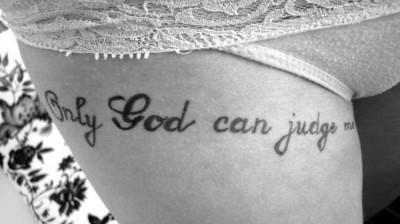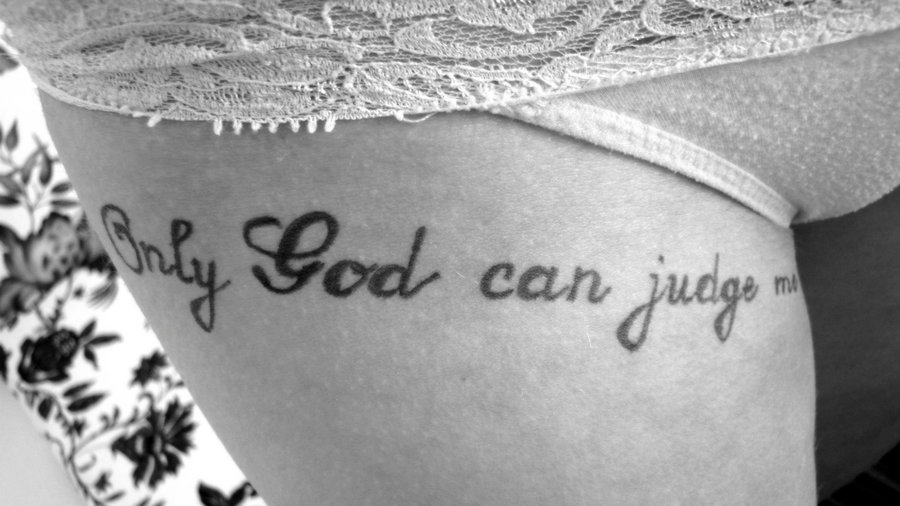
Heresy warning: I’m not sure I believe in God. Or, at the very least, if I believe in God, I do not believe in God as He Who Dwells on a Throne and Smites You When You Sin, as I was taught as a child. When I pray, I do so not necessarily out of some sort of feeling of divine commandedness, but out of my own personal need to focus and organize my thoughts at various points during the day. I do not think about God when I perform mitzvot — instead, I just do them. The deeper meaning I seek has very little to do with the Divine; instead, it is about me, and how I view myself in relation to the world around me.
When I imagine what community I hope to settle in one day, it is not a community that necessarily talks about God. My imagined community, will be (in addition to having a Trader Joe’s prominently featured within a reasonable distance) composed not of those with similar theologies to mine, but, instead, with similar values and practices to mine — or, at the very least, those who will respect my values and practices and see them as legitimate. In short, I really could not care less about what other people in my community think about God.
These two disparate thoughts were the first things I thought upon reading two articles last week: Jay Lefkowitz’s article in Commentary and my friend, teacher, and fellow JTS student, Jonah Rank’s article in Times of Israel. The former talked about the sociology of Orthodox Jews and what Lefkowitz terms the rise of “Social Orthodoxy,” wherein theology in young Modern Orthodox or traditionally observant Jews (like myself) takes a backseat to communal practices. The latter talked about God in relation to how we should treat women in Judaism.
I began questioning religion when I entered high school, and began wondering if Judaism (or, at least, traditionally observant Judaism) was for me at all. And, looking back, very few of my qualms with Judaism had to do with God — instead, they had to do with how we study and use ancient Jewish texts, how communities are formed, and how I as a queer person was viewed not by God, but by my co-religionists.
It was not until I entered college when I realized fully that God, and my perceptions thereof (I hesitate to refer to God with masculine pronouns), mattered very little to my day-to-day Judaism, and it also seemed to matter very little to those around me. Instead, we were able to study texts and come to our own conclusions not based on what we thought that God wanted, but based on what we thought it meant to be a Good Jew and an upstanding participant in the larger world around us.
When we talk about building communities, how people arrive in the community matters less than the beliefs that they used to get where they are today — no one, ultimately, can tell me what or how to believe, but they can ask me how to act. And, ultimately, the deep bonds of community will be formed not because we all have the same (if any) perceptions of God, but based on how we act.
It seems to me that it is when we talk about what God wants from us that we run into problems with Judaism. When we talk about God in a religion that specifically dictates very little on how to believe, but, instead focuses on how to act, we run into the problem of whose perception of God is right.
Ultimately, the “Social Orthodoxy” that Lefkowitz describes is directly at odds with the Judaism that Rank describes — one talks about practices, the other talks about beliefs. Specifically, Rank talks about a perception of God that (who? again, I hesitate) expects us to act in a certain way, specifically in regards to women.
Instead of focusing on what God wants, we focus on the communal expectations for ourselves and how we, as humans, interact with the world around us through our actions. Community brings unity, and unity brings meaning. God, on the other hand, is divisive: no two people have the same perceptions of God. Ultimately, as was pointed out by Malka Simkovich, we don’t need an answer to the biblical question of “Where are you?” We are here, and we are present, but we are not present to God. We are present to each other.
The innovation of “Social Orthodoxy” that Lefkowitz offers is not an innovation to my generation of Modern Orthodox and traditionally observant Jews. This, to us, is the norm. Many of us have grown up with little exposure to dogmatism and at least some exposure to religious pluralism, and have been taught that it what we do, not what we believe, that matters. Ultimately, our practices will unite us, but our theologies can divide us. It is my actions, not my beliefs, which give meaning to my day. Ultimately, it is the need for a community of those who straddle the border between Orthodoxy and (post-)modernity, and who try to find ways to lead lives that are both modern and committed to tradition that drives us to practice. We, as Modern Orthodox Jews who know what it is like to have one foot in two seemingly opposing worlds, need to have our practices — otherwise, we are left with nothing.
God might exist; God might not exist. I will never be able to know. Regardless, I will recite the evening prayer before I go to sleep tonight, and I will lay tefillin and pray Shaharit when I wake up tomorrow morning.
Amram Altzman is a student at List College.

